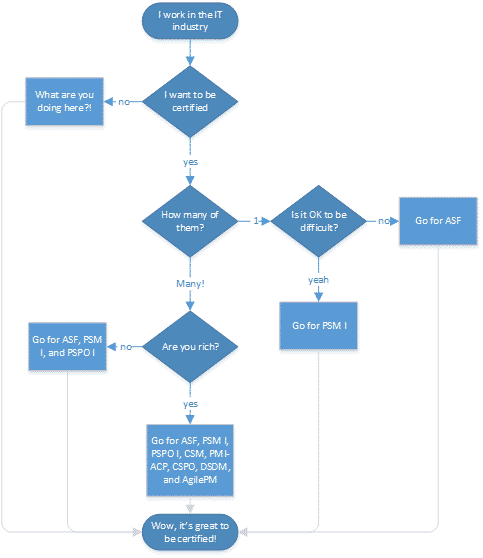Comparison of Agile and Scrum Certifications
Agile and Scrum are the new fashion nowadays. Most IT related companies are interested in hiring people who are familiar with the concepts and are preferably certified, even if the company is not really Agile. That’s why being certified is important for many of us.
But, which certification? PSM, CSM, or …?
Let’s take a look at them; I’ll try to explain and make it easy for you to decide.
Scrum Master Certifications
There are different types of certifications for Scrum Masters, Product Owners, and Developers. The fact is that everyone should start with the Scrum Master certification programs in my opinion, because that’s how you can know the framework.
The most famous Scrum Master certifications are as follows:
-
PSM I from Scrum.Org: it’s a great examination. Very precise and professional. You don’t even have to take any specific courses. As long as you can pass the online exam, it’s OK. After all, they just want to assess your knowledge. The price is not high too; it’s only $150. That’s why this examination is interesting for those who are interested in self-study and serious assessments. However, it’s hard to pass the exam, because the questions are tricky, and the passing score is 85%. (We offer training material for this program)
-
CSM from Scrum Alliance: this is also a famous certification. You need to take a standard course for that, and the exam is very easy to pass (or better say, really hard to fail). The courses are rather expensive.
The previous ones are focused on the Scrum framework, while there are two other certifications that cover both Agility, and the Scrum framework. They are about general knowledge, but in practice are close to what we expect from a Scrum Master certification. These two are:
-
ASF from EXIN: the exam difficulty is normal and the price is moderate. The positive point about it is that it is governed by one the famous examination institutes, EXIN. (We offer training material for this program)
-
PMI-ACP®: this is a long and rather hard examination. Also expensive (about $400), like other PMI® certifications. You also need to take certain training (classroom based or eLearning) and have enough Agile experience.
Product Owner Certifications
There are also Product Owner certifications that are mainly designed for… well, Product Owners. However, I believe these certification programs are also very helpful for Scrum Masters. These are the main ones:
-
PSPO I from Scrum.Org: similar to the PSM I certification, low-cost, hard to pass, without the need for training. (We offer training material for this program)
-
CSPO from Scrum Alliance: similar to the CSM certification, rather expensive, easy to pass, and requires specific training.
Scrum Developer Certifications
The term developer refers to anyone who’s involved in the production of the solution, which includes technical analysts, architects, programmers, testers, UI designers, and so on.
Most developers have difficulty learning how to create the solution incrementally, without upfront architecture. That’s why this type of certification can be helpful. However, such a course needs to be focused on a certain programming language to stay practical, and it makes it very difficult to design and run. That’s why this type of certification program is limited. Both Scrum.Org and Scrum Alliance provide such programs through their partners.
Other Certifications
If you’re not going to limit yourself to Scrum, you would have this option too:
- AgilePM® Foundation and Practitioner: this is from Agile Business Consortium and based on the Agile Project Framework (DSDM®), which is one of the first generation methods (similar to XP, Crystal, and Scrum). As opposed to Scrum, which is mainly designed for small teams, the Agile Project Framework is designed for large projects with multiple teams. (We offer training material for this program)
So, Which One?
Well, it’s not really easy to say, but I try to explain my own opinion for different scenarios (which others might not agree):

Related Courses
Our job is creating self-paced, online courses that are practical and pleasant! The following courses relate to the topic of this article, in case you’re interested:
By the way, the first lessons of each of these courses are free and you can take them even without registering.